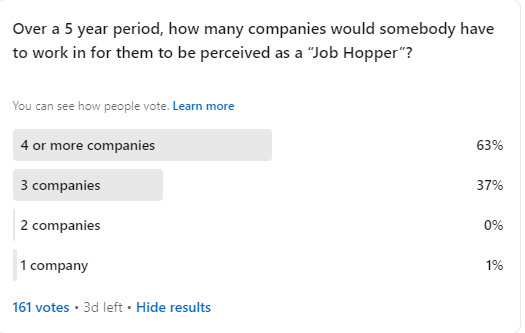
We’ve spent the last 9 years hiring specifically for tech start-ups and early-stage scale–ups across Europe. When discussing a client’s requirements, often in the top 3 is avoiding someone who has had too many jobs aka a “job hopper”.
But what is a job hopper? We asked our LinkedIn community the following question in a poll last week “Over a 5-year period, how many companies would somebody have to work in for them to be perceived as a “Job Hopper”?
The results were as follows:

So, if you’ve had 3 – 4 or more jobs in the last the poll results say you’re a job hopper… but does this mean that you, and everyone else in your talent pool, should be avoided?
So, here’s a list of some of the most common reasons shared for not hiring someone who’s a “job hopper”
- Are they just no good at their role?
- Are they disruptive?
- Are they not a team player?
- Do they lack the grit when it gets tough and just leave?
- Are they a poor decision maker?
- Do they have no loyalty?
- Are they JUST motivated by Money?
These are fair questions and can be accurate assumptions, but we believe there is a talent pool of available people in any geography who don’t fit the above mould and would still make great hires.
So, what are the tips when reviewing someone’s application and interviewing them that will help you to assess properly whether this person is worth hiring regardless of how many roles they’ve recently had?
- Is there a history of moving around or has it just been a recent thing, if they have previously shown long tenure, then what has changed?
- Dig into performance – can people back up their performance, especially in a sales role. Can you ask for their P60 to see what they earned? If they’ve been performing but just had back luck, then 100% you consider this person.
- Is there a history in their life of not sticking at things, in our experience those who show commitment in other areas of their lives are normally fairly committed to their careers.
- References – go into real detail, get on the phone with people, sure you can’t give a bad reference but a call with someone can tell you a lot.
- Do they act strangely, are there things they do or say that are unusual? OK so it’s a bit blunt, but does this person give you red flags when you speak with them. If in doubt, there is usually no doubt.
- What were their reasons for leaving roles, are they believable and are they realistic for the time spent at the company?
There has been huge change in tech over the last 2 years and a lot of companies have had to reduce their headcount significantly, often just to survive, which has nothing to do with the individual person or their performance.
So, in summary, should you be wary of someone who’s had more roles than you’d expect in a given time period? Yes of course you should, but we wouldn’t rule them out.”


Leave a Reply